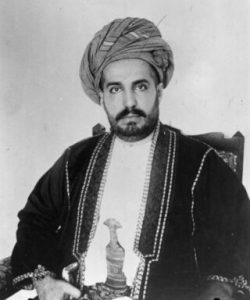On August 27, 1896, the United Kingdom and Zanzibar went to war. It became the shortest war in history. Already after thirty-eight minutes this short but fierce Anglo-Zanzibar War came to an end.

38 minutes

The war may have entered the history books as the shortest in history, but that doesn’t mean it claimed few casualties. On the Zanzibar side there were no fewer than five hundred dead; on the British side only one seaman was seriously injured. He recovered a short time later in hospital. Sultan Khalid bin Barghash managed to flee to the German consulate. As sultan he was replaced by the pro-British Hamud bin Muhammed (1853-1902). He then ruled Zanzibar for six years.
Banishment
The British repeatedly asked Germany for the extradition of the fled sultan, but were always unsuccessful. On October 2, Khalid bin Barghash was smuggled out of the country by the German navy and transferred to German East Africa. It was not until 1916, during the British conquest of East Africa, that Khalid was finally captured. The British exiled him to the Seychelles and then to Saint Helena. Later he was allowed to return to East Africa where he died in 1927.







